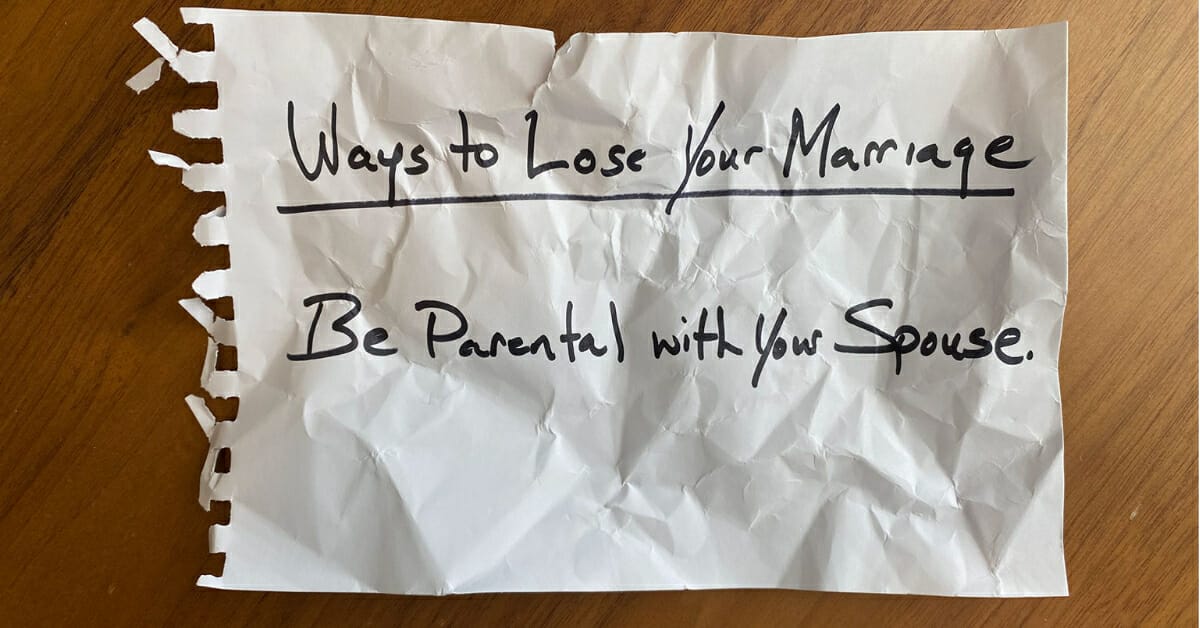How would you respond to the following question… “Are you the CEO in your marriage?” Maybe you would say, “Well, no! of course not!” Maybe you say your spouse acts like the CEO. Or, maybe you would say, “What do you mean by that?”
DO MARRIAGES HAVE CEO’S?
Every company has a CEO, or Chief Executive Officer. This person is the highest-ranking person in the company and the one ultimately responsible for making managerial decisions.
By this definition, you might say, “Marriages don’t have CEO’s. They’re not a business or a corporation.” And you would be right.
But many marriages still have a CEO. I call them the Chief Ego Officer, and they function much in the same way as the CEO of a company. They carry a lot of weight in the relationship, especially when it comes to direction and decision-making.
DECIDING WHO’S THE CEO.
How can you tell if you’re the CEO in the marriage? Ask yourself the following questions…and try to be honest with yourself:
- Do you tend to make most of the decisions?
- Do you get upset when your spouse makes a decision without checking with you first?
- Do you often explain to your spouse why your way is better?
- Do you have trouble listening to and considering your spouse’s opinions and approaches?
- Do you get frustrated or angry when your spouse doesn’t take your advice or do things as you want?
- Do you look down on your spouse for thinking or believing as they do?
- Do you see your spouse’s differences of opinion as a threat to you or the marriage?
You may believe this list better fits your spouse than it does you, but the more you answer “yes” to these questions, the more likely you are to be the Chief Ego Officer of the relationship. You may have become the CEO in response to their behavior, but it still will affect your marriage.
WHAT ARE THE EFFECTS OF A CEO ON A MARRIAGE?
Though a company benefits from a strong CEO, a marriage suffers from a strong CEO. When a marriage has a strong Chief Ego Officer, two things typically happen:
The marriage becomes oppressive.
Whether it’s implied or stated out-right, the CEO of the marriage has a my-way-or-the-highway approach to the relationship. The other spouse’s thoughts, opinions, or approaches are ignored, dismissed, and not considered. The CEO increasingly stifles their spouse, not allowing them to be themselves.
This is a poison that will slowly kill the love, affection, and attraction in the relationship. And, the longer this continues, the harder it becomes to recover the relationship.
Then, the second effect a Chief Ego Officer has on marriage is…
The marriage becomes abusive.
Many CEO marriages stay stuck in the oppressive stage. But there are some marriages that progress to the abusive stage.
When the Chief Ego Officer experiences disagreement or push back from their spouse, they will begin to push back themselves. At first, the CEO will try to convince or cajole their spouse into seeing things their way. If that doesn’t work, the CEO’s approach will become more pointed and frustrated. If that doesn’t work, their anger will come out and they will become emotionally abusive, and possibly physically abusive.
WHAT TO DO IF YOU’RE IN A CEO RELATIONSHIP.
If you find yourself in a CEO marriage, what should you do? Well…
If You’re the CEO…
- Humble yourself. Apologize to your spouse for being so dominant and inconsiderate. This is hard, especially for a CEO, but you need to start here. And your apology must be sincere, not just a way to get the heat off or to get your spouse to soften back up to you. If you’re not really repentant for your behavior, you’ve not changed and the relationship can’t change.
- Invite and listen to your spouse’s opinions. This is not just something to check off the list so you can then get on to how you want to do things. Take your time and honestly listen to them. To paraphrase Stephen Covey, seek first to understand them before trying to get them to understand you. Hear their thoughts, their heart, and their desires.
- Look for reasons to defer to your spouse. This is hard for a Chief Ego Officer because they usually believe their spouse should defer to them. But try hard to defer to your spouse whenever possible. You may feel your way is better, but don’t push your way through. Share it with your spouse and make sure you both agree your way is better before implementing it.
- Make the above a way of life. If you just do these things to get back on your spouse’s good side, then you’ve not really changed. You’re just manipulating the situation to get back in their good graces. These changes need to be a way of life for you…even if the marriage fails.
If Your Spouse is the CEO…
If your spouse is the CEO, you have three options:
- Continue on as it is. Some people decide they will just go on tolerating the CEO’s behavior. Perhaps they don’t want to rock the boat out of fear of the CEO’s response. Maybe they’re concerned for others in the family. Or maybe their own insecurities make them wonder if there’s something wrong with them. Continuing on as-is is a valid option, but know that such a marriage rarely improves over time.
- Begin to push back against the CEO’s behavior. This could go from standing up for yourself and your opinions, to not being easily coerced, to insisting on counseling, to threatening to leave the relationship. Chances are, the CEO will not react favorably to such changes, and they will do whatever they can to get things back to “normal.” If they feel they’ve got no other option, the CEO will seem to concede, but it usually doesn’t last.
- Leave the relationship. If all else fails, you may decide you can no longer tolerate the relationship and make plans to leave. Departure is a last resort option and can either be temporary, until the CEO truly changes, or permanent. The CEO may have a variety of responses to your decision to leave. They may act shocked and say they didn’t know anything was wrong. They may try to convince you that things are not that bad. They may get angry and blame you for all the problems. And if all else fails, they may concede and offer to make changes. But, oftentimes their changes are only an attempt to get you back in the fold.
A FINAL THOUGHT…
Can CEO marriages really change? Yes! But…the ego of the Chief Ego Officer will not change quickly or easily. It will take work and practice to learn to exchange ego for humility. But it can be done. So, if you’re the Chief Ego Officer in the marriage, honestly and humbly enlist the aid of close friends, accountability partners, pastors, or counselors. Do whatever it takes to resign as CEO of your marriage. And if your spouse is the CEO, do everything in your power to share the problem and encourage them to change. Either way, you (and they) will be the better for it.












